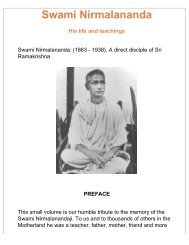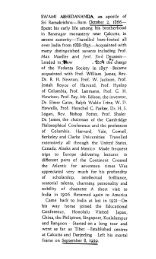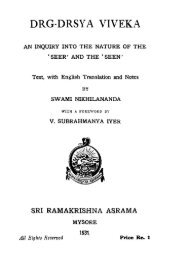<strong>Practical</strong> <strong>Vedanta</strong>HOW IT MUST EMBRACE DIFFERENT TYPES OF MINDS AND METHODSWheresoever our senses reach, or whatsoever our minds imagine, we find thereinthe action and reaction of two forces, the one counteracting the other and causingthe constant play of the mixed phenomena that we see around us, and of thosewhich we feel in our minds. In the external world, the action of these oppositeforces is expressing itself as attraction and repulsion, or as centripetal andcentrifugal forces; and in the internal, as love and hatred, good and evil. We repelsome things, we attract others. We are attracted by one, we are repelled byanother. Many times in our lives we find that without any reason whatsoever weare, as it were, attracted towards certain persons; at other times, similarly, we arerepelled by others. This is patent to all, and the higher the field of action, the morepotent, the more remarkable, are the influences of these opposite forces. Religionis the highest plane of human thought and life, and herein we find that theworkings of these two forces have been most marked. The intensest love thathumanity has ever known has come from religion, and the most diabolical hatredthat humanity has known has also come from religion. The noblest words of peacethat the world has ever heard have come from men on the religious plane, and thebitterest denunciation that the world has ever known has been uttered by religiousmen. The higher the object of any religion and the finer its organisation, he moreremarkable are its activities. No other human motive has deluged the world withblood so much as religion; at the same time, nothing has brought into existence somany hospitals and asylums for the poor; no other human influence has taken suchcare, not only of humanity, but also of the lowest of animals, as religion has done.Nothing makes us so cruel as religion, and nothing makes us so tender as religion.This has been so in the past, and will also, in all probability, be so in the future.Yet out of the midst of this din and turmoil, this strife and struggle, this hatred andjealousy of religions and sects, there have arisen, from time to time, potent voices,drowning all this noise — making themselves heard from pole to pole, as it were— proclaiming peace and harmony. Will it ever come?Is it possible that there should ever reign unbroken harmony in this plane ofmighty religious struggle. The world is exercised in the latter part of this centuryby the question of harmony; in society, various plans are being proposed, andattempts are made to carry them into practice; but we know how difficult it is todo so. People find that it is almost impossible to mitigate the fury of the struggleof life, to tone down the tremendous nervous tension that is in man. Now, if it is sodifficult to bring harmony and peace to the physical plane of life — the external,gross, and outward side of it — then a thousand times more difficult is it to bringpeace and harmony to rule over the internal nature of man. I would ask you for thetime being to come out of the network of words. We have all been hearing fromchildhood of such things as love, peace, charity, equality, and universalfile:///C|/Documents%20and%20Settings/Chitra%20Selva...oksBySwami/<strong>Practical</strong><strong>Vedanta</strong>/<strong>Practical</strong><strong>Vedanta</strong>PDF.html (50 of 113)2/26/2007 12:24:33 AM
<strong>Practical</strong> <strong>Vedanta</strong>brotherhood; but they have become to us mere words without meaning, wordswhich we repeat like parrots, and it has become quite natural for us to do so. Wecannot help it. Great souls, who first felt these great ideas in their hearts,manufactured these words; and at that time many understood their meaning. Lateron, ignorant people have taken up those words to play with them and madereligion a mere play upon words, and not a thing to be carried into practice. Itbecomes "my father's religion", "our nation's religion", "our country's religion",and so forth. It becomes only a phase of patriotism to profess any religion, andpatriotism is always partial. To bring harmony into religion must always bedifficult. Yet we will consider this problem of the harmony of religions.We see that in every religion there are three parts — I mean in every great andrecognised religion. First, there is the philosophy which presents the whole scopeof that religion, setting forth its basic principles, the goal and the means ofreaching it. The second part is mythology, which is philosophy made concrete. Itconsists of legends relating to the lives of men, or of supernatural beings, and soforth. It is the abstractions of philosophy concretised in the more or less imaginarylives of men and supernatural beings. The third part is the ritual. This is still moreconcrete and is made up of forms and ceremonies, various physical attitudes,flowers and incense, and many other things, that appeal to the senses. In theseconsists the ritual. You will find that all recognised religions have these threeelements. Some lay more stress on one, some on another. Let us now take intoconsideration the first part, philosophy. Is there one universal philosophy? Not yet.Each religion brings out its own doctrines and insists upon them as being the onlytrue ones. And not only does it do that, but it thinks that he who does not believein them must go to some horrible place. Some will even draw the sword to compelothers to believe as they do. This is not through wickedness, but through aparticular disease of the human brain called fanaticism. They are very sincere,these fanatics, the most sincere of human beings; but they are quite asirresponsible as other lunatics in the world. This disease of fanaticism is one of themost dangerous of all diseases. All the wickedness of human nature is roused byit. Anger is stirred up, nerves are strung high, and human beings become liketigers.Is there any mythological similarity, is there any mythological harmony, anyuniversal mythology accepted by all religions? Certainly not. All religions havetheir own mythology, only each of them says, "My stories are not mere myths."Let us try to understand the question by illustration. I simply mean to illustrate, Ido not mean criticism of any religion. The Christian believes that God took theshape of a dove and came down to earth; to him this is history, and not mythology.The Hindu believes that God is manifested in the cow. Christians say that tobelieve so is mere mythology, and not history, that it is superstition. The Jewsthink that if an image be made in the form of a box, or a chest, with an angel oneither side, then it may be placed in the Holy of Holies; it is sacred to Jehovah; butif the image be made in the form of a beautiful man or woman, they say, "This is afile:///C|/Documents%20and%20Settings/Chitra%20Selva...oksBySwami/<strong>Practical</strong><strong>Vedanta</strong>/<strong>Practical</strong><strong>Vedanta</strong>PDF.html (51 of 113)2/26/2007 12:24:33 AM
- Page 1 and 2: Practical VedantaPractical VedantaP
- Page 3 and 4: Practical Vedantaworld. If I am a s
- Page 5 and 6: Practical Vedantadifference is only
- Page 7 and 8: Practical VedantaThe ideal of faith
- Page 9 and 10: Practical Vedantamoment of our live
- Page 11 and 12: Practical Vedantaof the Christs and
- Page 13 and 14: Practical Vedanta"This life is Brah
- Page 15 and 16: Practical Vedantadark fifteen days,
- Page 17 and 18: Practical Vedantalife. This is the
- Page 19 and 20: Practical Vedantaeverything would b
- Page 21 and 22: Practical Vedantait is only through
- Page 23 and 24: Practical Vedantawhich is that subt
- Page 25 and 26: Practical Vedantanoumenon and pheno
- Page 27 and 28: Practical Vedantato which is the be
- Page 29 and 30: Practical VedantaAbsolute.The finit
- Page 31 and 32: Practical Vedantawhich is not the q
- Page 33 and 34: Practical Vedantaexperience that th
- Page 35 and 36: Practical Vedantafulfilled. The Jiv
- Page 37 and 38: Practical Vedantabetween the pure r
- Page 39 and 40: Practical Vedantacome out straight.
- Page 41 and 42: Practical Vedantawar with one anoth
- Page 43 and 44: Practical Vedantanobody could under
- Page 45 and 46: Practical VedantaMy idea, therefore
- Page 47 and 48: Practical Vedantathe same methods.
- Page 49: Practical Vedantavarious minds, all
- Page 53 and 54: Practical Vedantabrotherhood, but w
- Page 55 and 56: Practical Vedantawe all go with ves
- Page 57 and 58: Practical Vedantareason. What can y
- Page 59 and 60: Practical Vedantabeen preached in t
- Page 61 and 62: Practical Vedantathe husband kisses
- Page 63 and 64: Practical Vedantaof the knowledge a
- Page 65 and 66: Practical Vedantafor those who only
- Page 67 and 68: Practical Vedantasun exists because
- Page 69 and 70: Practical Vedantaof death was pleas
- Page 71 and 72: Practical VedantaGod. We must learn
- Page 73 and 74: Practical Vedantaa plague comes, it
- Page 75 and 76: Practical VedantaAtman? "As with a
- Page 77 and 78: Practical Vedantathat immortal One,
- Page 79 and 80: Practical Vedantaand the third egoi
- Page 81 and 82: Practical VedantaWitness of the uni
- Page 83 and 84: Practical VedantaPractical Vedanta1
- Page 85 and 86: Practical Vedantaeternal ; every ot
- Page 87 and 88: Practical Vedantafaculty, Buddhi, w
- Page 89 and 90: Practical VedantaPractical Vedanta1
- Page 91 and 92: Practical Vedantastepping-stone to
- Page 93 and 94: Practical Vedantarecognition? Findi
- Page 95 and 96: Practical Vedantasentient." This is
- Page 97 and 98: Practical Vedantaessentially differ
- Page 99 and 100: Practical Vedantaexistence is limit
- Page 101 and 102:
Practical Vedantalive, for I am lif
- Page 103 and 104:
Practical Vedantasee from Kapila's
- Page 105 and 106:
Practical Vedantalimitation, but th
- Page 107 and 108:
Practical Vedantaperfect, infinite,
- Page 109 and 110:
Practical Vedantaindividuality, of
- Page 111 and 112:
Practical Vedantarepeat [something]
- Page 113:
Practical Vedantaperson who dies in
















